
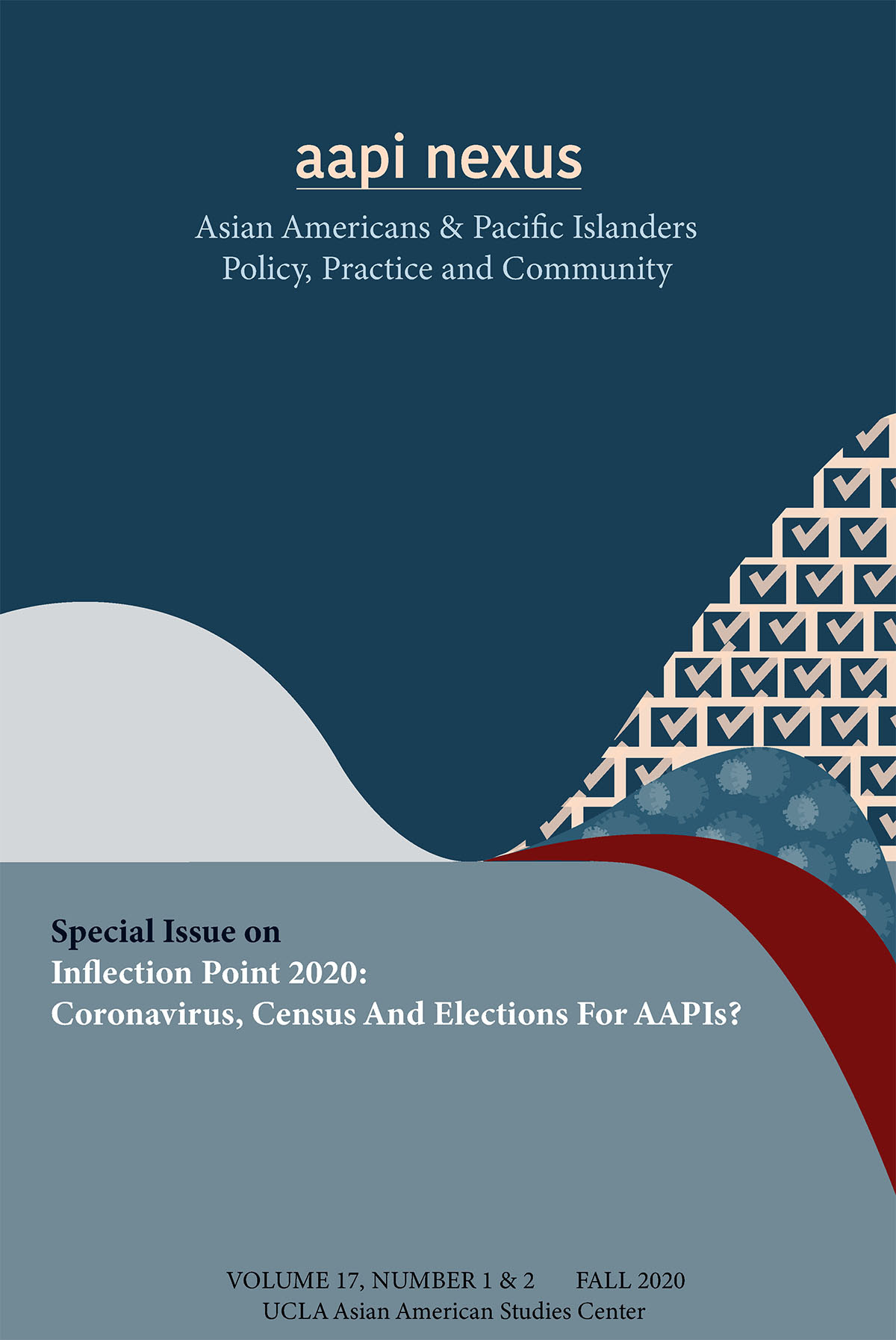 |
Inflection Point 2020: Coronavirus, Census and Elections for AAPIs features over 50 leading scholars, applied-researchers, and community leaders from all over the nation examining the impact of COVID-19, the 2020 Census, and Elections on Asian Americans, Native Hawaiians, and other Pacific Islanders (AANHPI) communities, as well as models, solutions and policy recommendations. This special issue provides timely information that enhances the ability to take action in the areas of advocacy, strategic planning, policy development and programming with regards to AANHPI communities. View abstracts and download articles at no cost at: https://bit.ly/aapinexus17. |
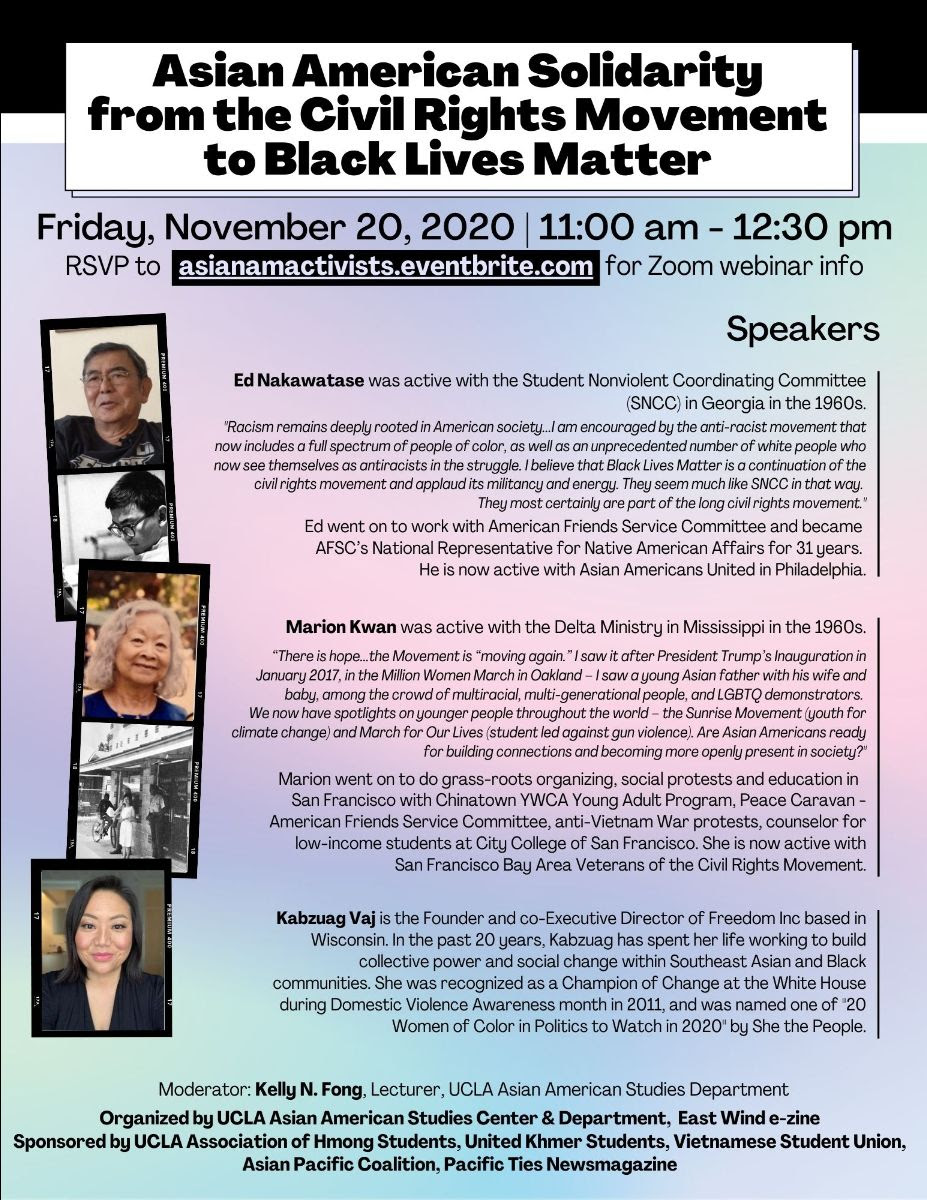 |
Friday, November 20, 11:00am - 12:30pm Via Zoom, Register for Link http://asianamactivists.eventbrite.com Join us for a special discussion on Asian American solidarity and social and activist movements with speakers Ed Nakawatase, Marion Kwan, and Kabzuag Vaj, and moderated with Kelly N. Fong. This event is co-organized by the UCLA Asian American Studies Center and Department and East Wind E-Zine. Ed Nakawatase was active with the Student Nonviolent Coordinating Committee (SNCC) in Georgia in the 1960s. Ed went on to work with American Friends Service Committee and became AFSC’s National Representative for Native American Affairs for 31 years. He is now active with Asian Americans United in Philadelphia. Marion Kwan was active with the Delta Ministry in Mississippi in the 1960s. Marion went on to do grass-roots organizing, social protests and education in San Francisco with Chinatown YWCA Young Adult Program, Peace Caravan - American Friends Service Committee, anti-Vietnam War protests, counselor for low-income students at City College of San Francisco. She is now active with San Francisco Bay Area Veterans of the Civil Rights Movement. Kabzuag Vaj is the Founder and co-Executive Director of Freedom Inc based in Wisconsin. In the past 20 years, Kabzuag has spent her life working to build collective power and social change within Southeast Asian and Black communities. She was recognized as a Champion of Change at the White House during Domestic Violence Awareness month in 2011, and was named one of "20 Women of Color in Politics to Watch in 2020" by She the People. Supported by UCLA Association of Hmong Students, United Khmer Students, Vietnamese Student Union, Asian Pacific Coalition, Pacific Ties Newsmagazine. |
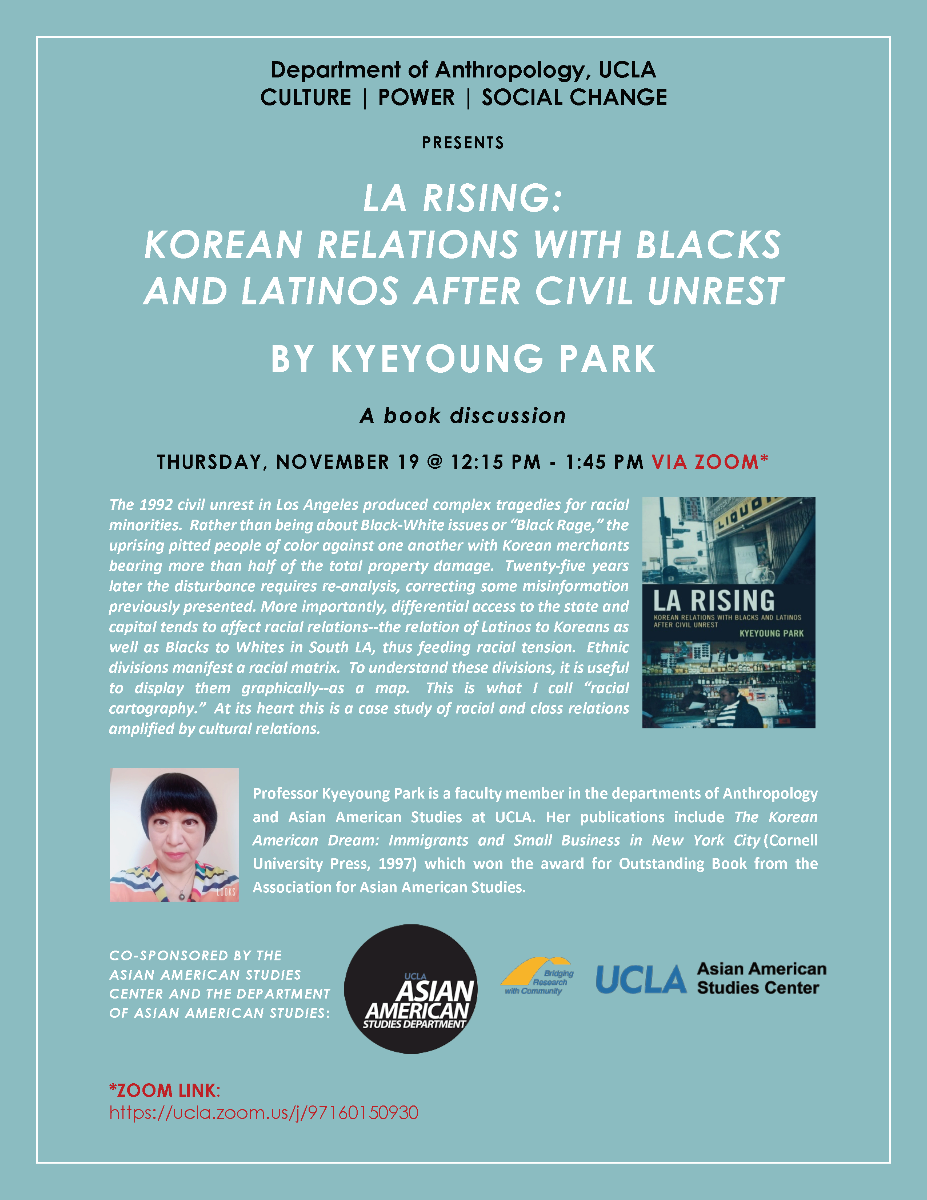 |
Thursday, November 19, 12:15pm - 1:45pm Via Zoom: Webinar Link In LA Rising: Korean Relations with Blacks and Latinos after Civil Unrest, Kyeyoung Park revisits the Los Angeles unrest of 1992 and the interethnic and racial tensions that emerged. The 1992 civil unrest in Los Angeles produced complex tragedies for racial minorities. Rather than being about Black-White issues or "Black Rage," the uprising pitted people of color against one another with Korean merchants bearing more than half of the total property damage. Twenty-five years later the disturbance requires re-analysis, correcting some misinformation previously presented. More importantly, differential access to the state and capital tends to affect racial relations--the relation of Latinos to Koreans as well as Blacks to Whites in South LA, thus feeding racial tension. Ethnic divisions manifest a racial matrix. To understand these divisions, it is useful to display them graphically--as a map. This is what Park calls "racial cartography." At its heart this is a case study of racial and class relations amplified by cultural relations. Professor Kyeyoung Park is a faculty member in the departments of Anthropology and Asian American Studies at UCLA. Her publications include The Korean American Dream: Immigrants and Small Business in New York City (Cornell University Press, 1997) which won the award for Outstanding Book from the Association for Asian American Studies. |
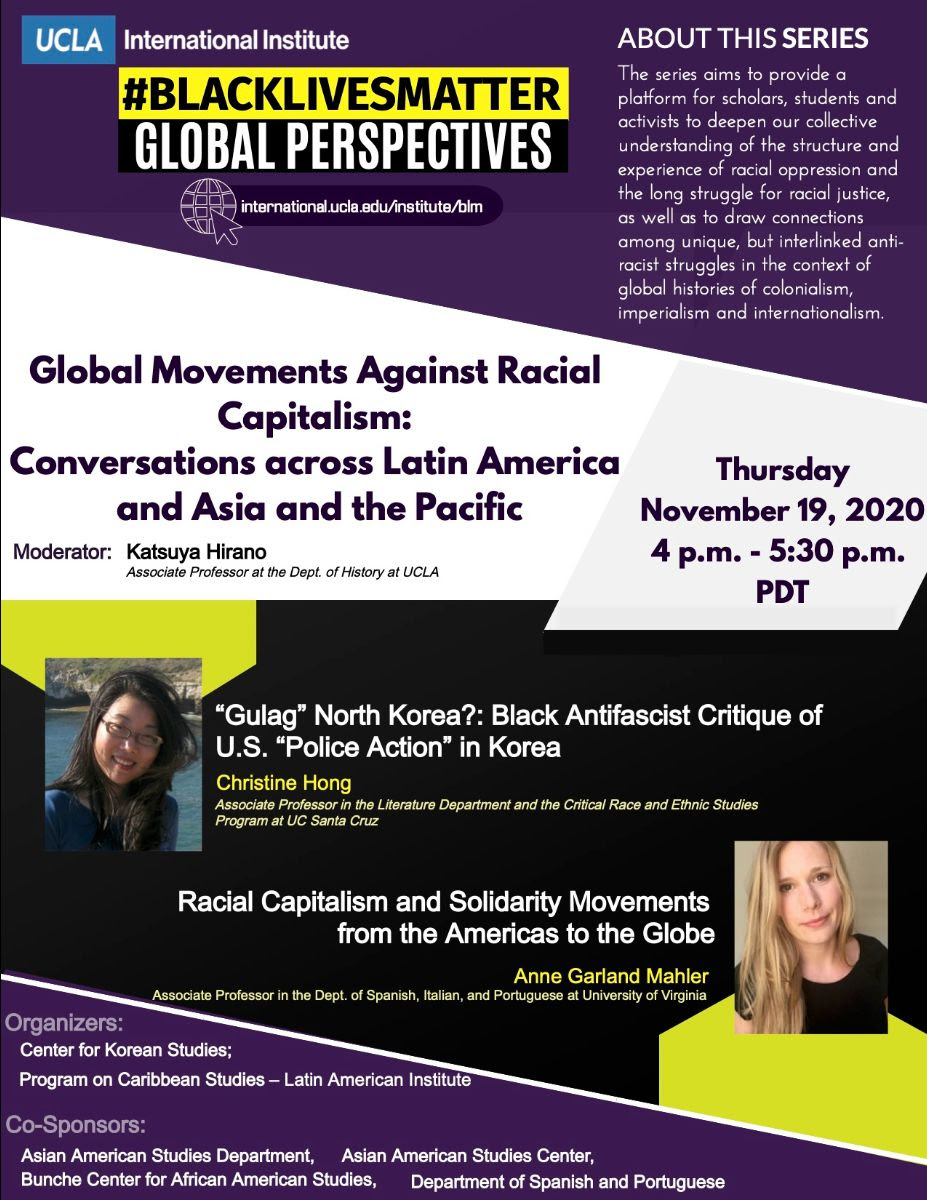 |
Thursday, November 19, 4:00pm - 5:30pm Via Zoom: Webinar Link How are struggles against anti-black racism in the United States connected to a longer history of global movements against racial capitalism? This event features two distinguished scholars who will discuss the stakes of transnational solidarity politics for racial and decolonial liberation in Latin America and across Asia and the Pacific. Their talks highlight the origins and the need to internationalize the fight against racism in the context of Cold War militarism and US empire-building abroad as well as grassroots struggles for racial justice at home. They also highlight the rich political traditions and histories of radical Black artists and intellectuals in engaging with and advancing emancipatory movements against racial capitalism around the world. Featured Speakers:
Moderator: Katsuya Hirano, Associate Professor, History Main organizers: UCLA Program on Caribbean Studies and Center for Korean Studies Co-sponsors: Asian American Studies Center, African Studies Center, Department of Asian American Studies, Department of Spanish and Portuguese, Ralph J. Bunche Center for African American Studies |
 |
The UCLA Center for Neighborhood Knowledge (CNK), in collaboration with Ong & Associates, recently released a new report on COVID-19 pandemic impacts on minority-owned businesses in Los Angeles. Previous CNK studies have documented the disproportionate adverse impacts of the pandemic on marginalized neighborhoods in labor and housing markets. The new report focuses on small businesses and examines whether the COVID-19 crisis disproportionately impacted local businesses in ethnic neighborhoods in Los Angeles. Answers to this question provide academic insights on racial systemic inequality and inform policy interventions, according to Paul Ong, co-author of the report and CNK director. "If the disparities are significant, there are profound policy implications. Race-conscious government efforts to address systemic racism are needed to ensure an equitable economic recovery," the researchers said. The team used location data to analyze foot traffic patterns to restaurants and retail locations in ethnic and comparison neighborhoods from February through September 2020. The results indicate an earlier and steeper decline in commercial activity in Chinatown and, while retail was resilient in ethnic neighborhoods, restaurants suffered greater declines on average than in comparison neighborhoods. Ong and colleagues found that overall, the ethnic neighborhoods collectively performed worse than the county as a whole prior to lockdown and performed no better than the county under shelter-in-place orders. The project was partially supported with grants from the UCLA Luskin School of Public Affairs (funded by Southern California Grantmakers) and from the UCLA Asian American Studies Center (funded by the Stanley Kow Lau and Dora Wong Lau Endowment). Learn more about the report from this release and access the report and others from the Asian American Studies Center on our website. |
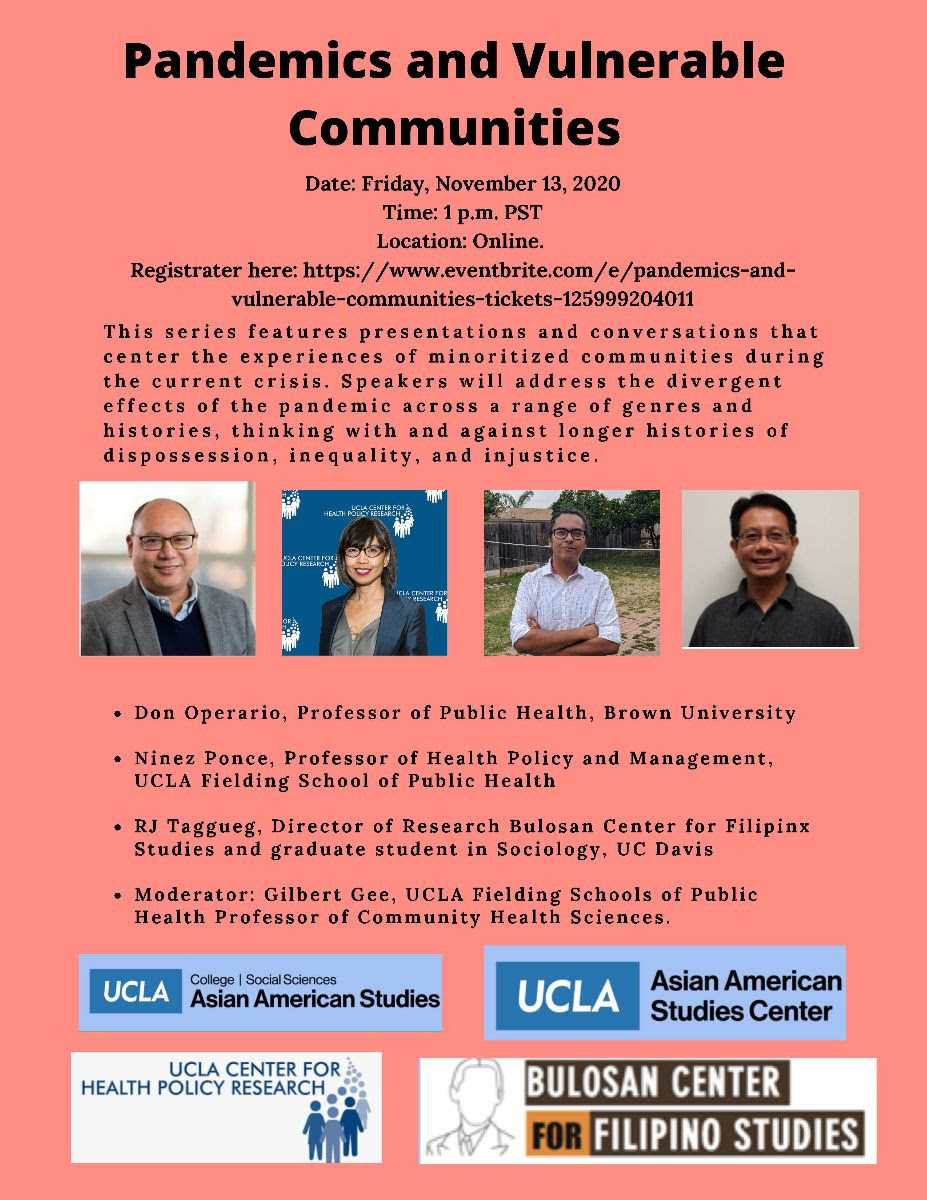 |
Friday, November 13, 1:00pm - 2:30pm Online, Register for Link Join us for a special online discussion, "Pandemics and Vulnerable Communities," that will focus on the impact of this current crisis. It will feature AASC Faculty Advisory Committee (FAC) member Professor Ninez Ponce (UCLA Fielding School of Public Health), Professor Don Operario (Brown University), and RJ Taggueg (Bulosan Center for Filipnx Studies), with AASC FAC Chair Professor Gilbert Gee (UCLA Fielding School of Public Health) moderating. Register and find out more here. |
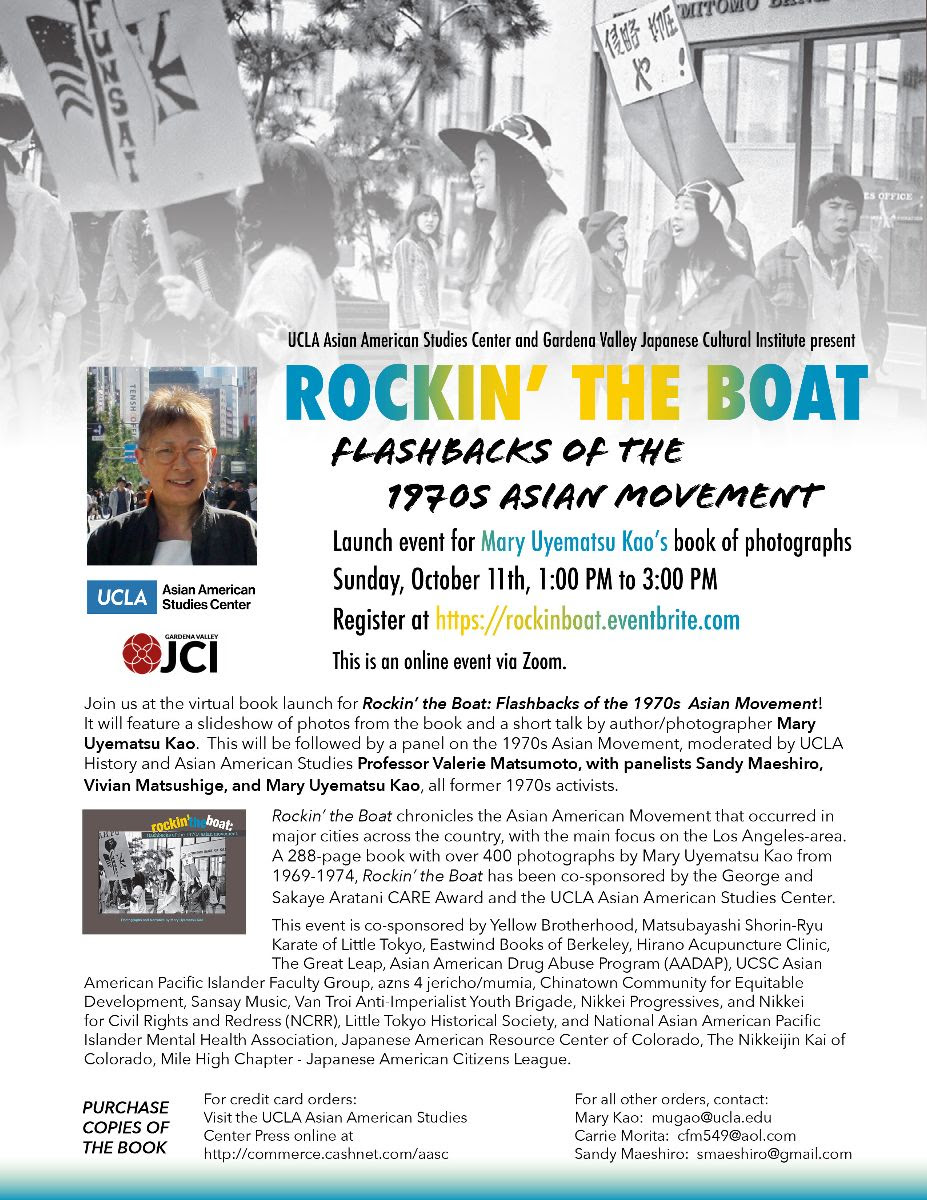 |
Sunday, October 11, 1:00pm - 3:00pm Via Zoom, Register for Link Join us at the virtual book launch of Rockin' the Boat: Flashbacks of the 1970's Asian Movement! It will feature a short slide show of photos from the book, a short talk by author/photographer Mary Uyematsu Kao, and a panel moderated by UCLA History and Asian American Studies Professor Valerie Matsumoto, with panelists Sandy Maeshiro, Vivian Matsushige, and Mary Uyematsu Kao, all former 1970's activists. Rockin' the Boat chronicles the Asian American Movement that occurred in major cities across the country, with the main focus on the Los Angeles-area. A 288-page book with over 400 photographs by Mary Uyematsu Kao from 1969-1974, Rockin' the Boat has been co-sponsored by the George and Sakaye Aratani CARE Award and the UCLA Asian American Studies Center. This event is co-sponsored by Yellow Brotherhood, Matsubayashi Shorin-Ryu Karate of Little Tokyo, Eastwind Books of Berkeley, Hirano Acupuncture Clinic, The Great Leap, Asian American Drug Abuse Program (AADAP), UCSC Asian American Pacific Islander Faculty Group, azns 4 jericho/mumia, Chinatown Community for Equitable Development, Sansay Music, Van Troi Anti-Imperialist Youth Brigade, Nikkei Progressives, and Nikkei for Civil Rights and Redress (NCRR), Little Tokyo Historical Society, and National Asian American Pacific Islander Mental Health Association, Japanese American Resource Center of Colorado, The Nikkeijin Kai of Colorado, Mile High Chapter - Japanese American Citizens League. |
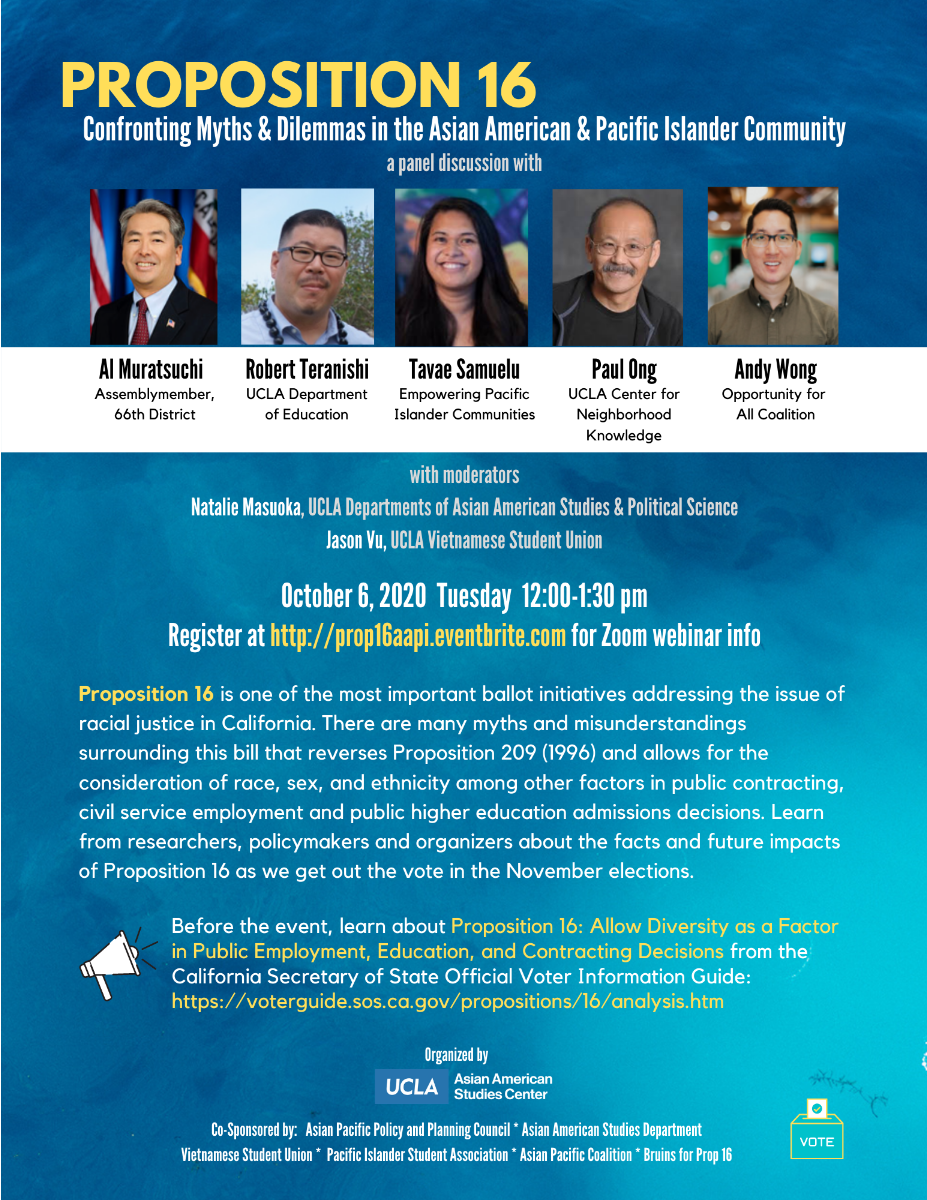 |
Tuesday, October 6, 12:00pm - 1:30pm Via Zoom, Register You can also watch via the YouTube Livestream (no registration required). Proposition 16 is one of the most important ballot initiatives addressing the issue of racial justice in California. There are many myths and misunderstandings surrounding this bill that reverses Proposition 209 (1996) and allows for the consideration of race, sex, and ethnicity among other factors in public contracting, civil service employment, and public higher education admissions decisions. Learn from researchers, policymakers, and organizers about the facts and future impacts of Proposition 16 as we get out the vote in the November elections. Before the event, learn about Proposition 16: Allow Diversity as a Factor in Public Employment, Education, and Contracting Decisions from the California Secretary of State Official Voter Information Guide at: https://voterguide.sos.ca.gov/propositions/16/analysis.htm |
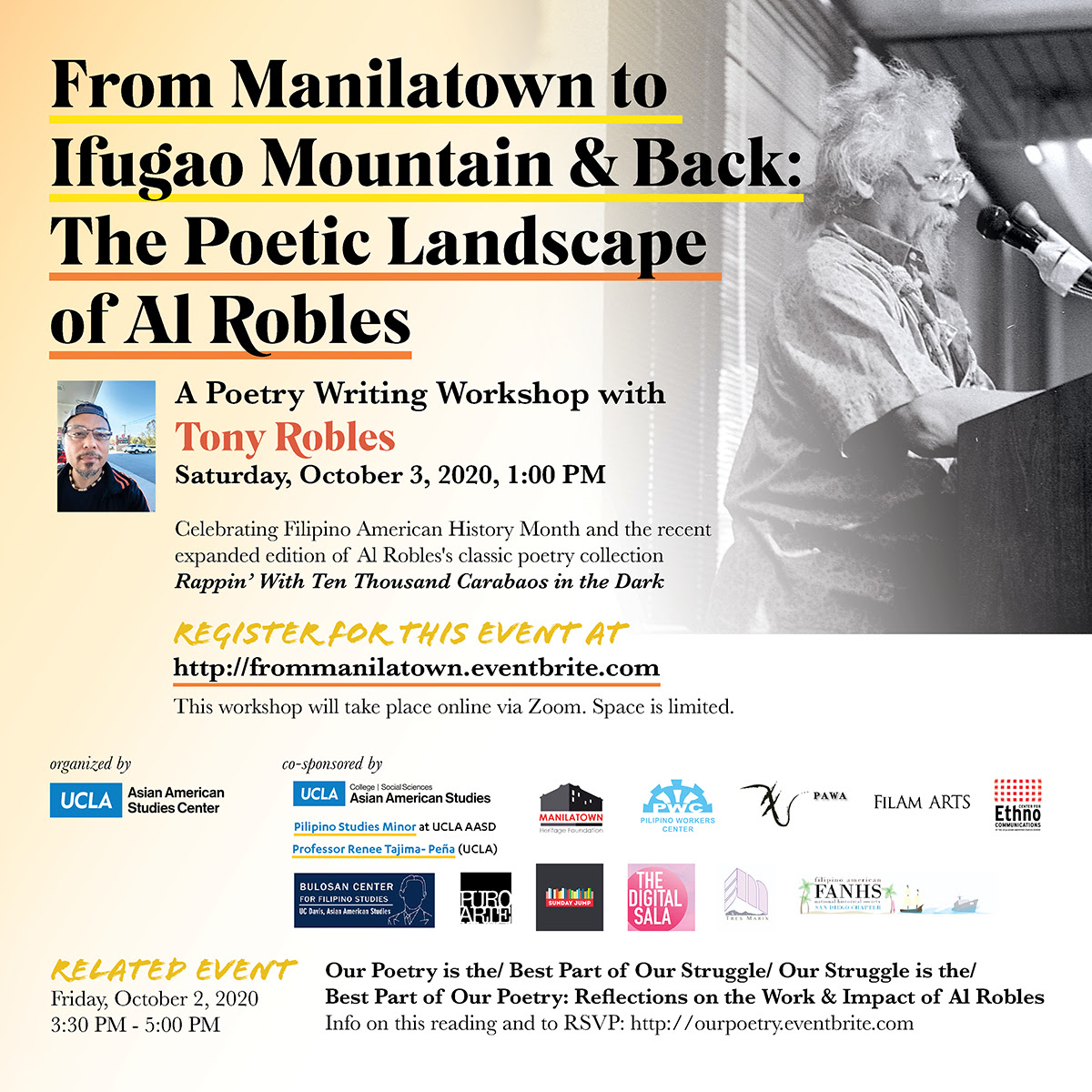 |
Saturday, October 3, 1:00pm - 4:00pm Join this free poetry writing workshop with writer and housing justice advocate, Tony Robles, nephew of Al Robles. Tony Robles is a writer, housing justice advocate, and the Writer in Residence at the Carl Sandburg Home National Historic Site in Flat Rock, North Carolina. Register: http://frommanilatown.eventbrite.com |
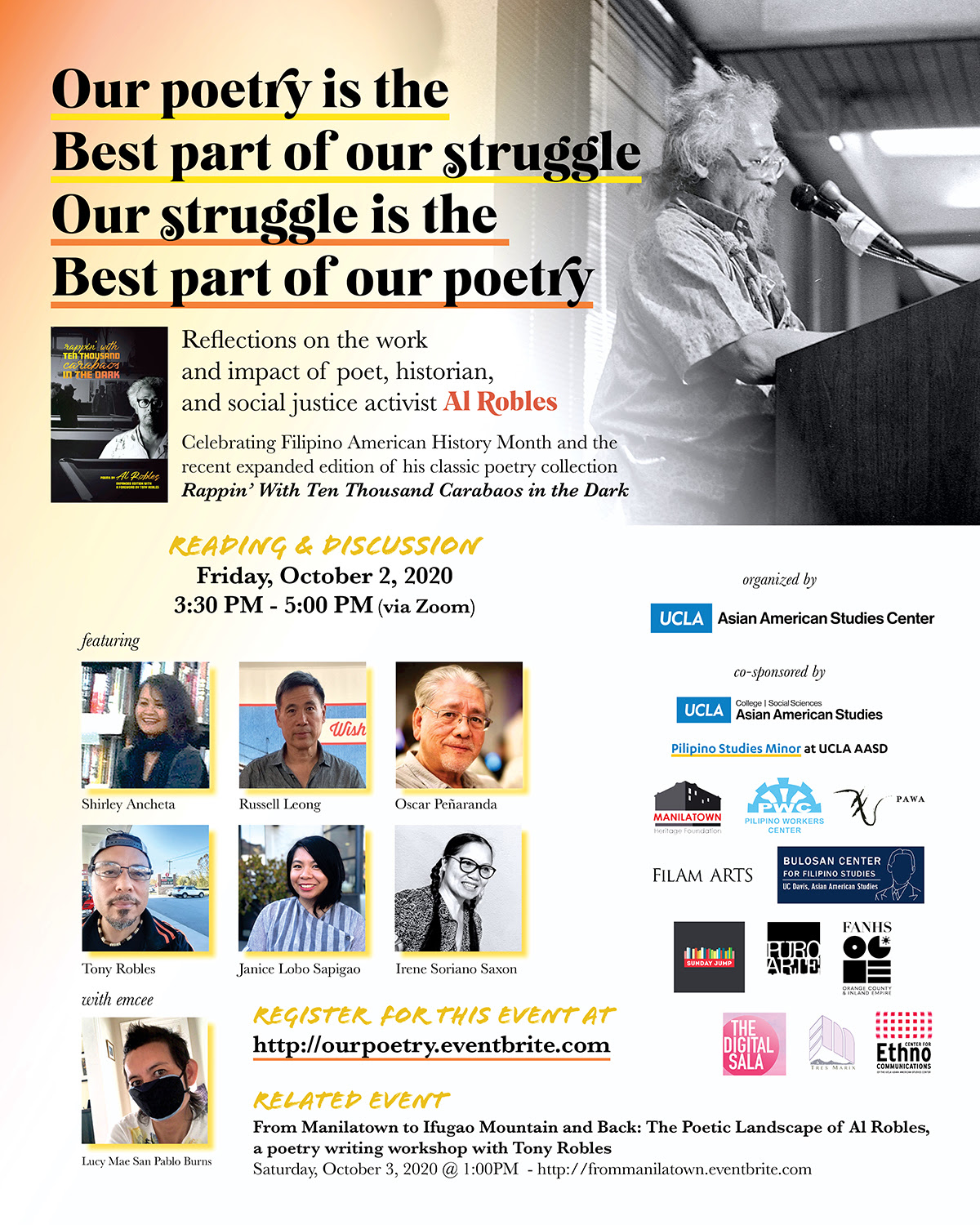 |
Friday, October 2, 3:30pm - 5:00pm Join us for a special online program that will remember Filipino American poet Al Robles, whose writing and activism reflected his deep commitment to community, especially through his documenting the stories of Filipino manongs and participating in the struggles for the International Hotel (I-Hotel) in San Francisco and housing justice for low-income residents. This event is in celebration of Filipino American History Month and the recent expanded edition of his classic poetry collection Rappin' With Ten Thousand Carabaos in the Dark (UCLA AASC Press). Register for the reading & discussion: http://ourpoetry.eventbrite.com. |
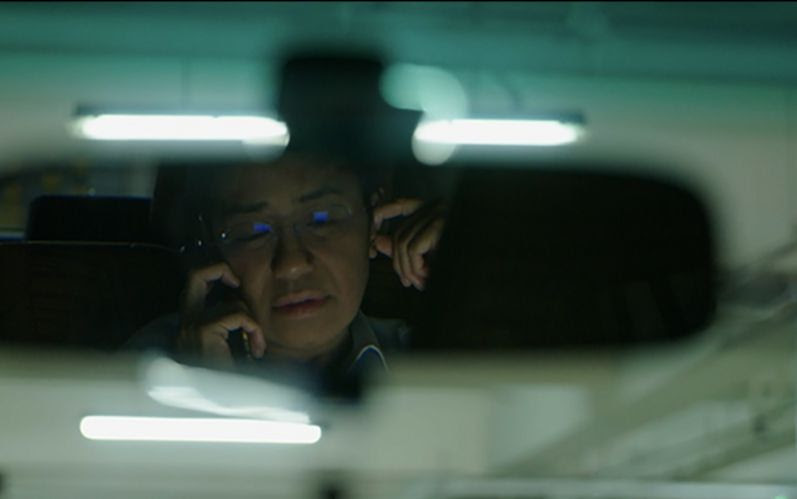 |
Thursday, October 1, 2020 In collaboration with Cornell University, UCLA, Barnard College (Columbia University), University of Toronto, Rutgers University, and Los Angeles' Visual Communications (VC), you are invited to an international screening of A Thousand Cuts by Ramona Diaz, followed a panel featuring Maria Ressa (Rappler), Jinee Lokaneeta (Drew University), and Gina Dent (UCSC). This panel will be moderated by Neferti Tadiar (Barnard College). Documentary Screening Available to view from 8:00am to 11:59pm on October 1st Register for the screening by Wednesday, September 30, 2020 at 5:00pm: https://www.eventbrite.com/e/a-thousand-cuts-media-freedom-and-authoritarian-brutality-registration-120320332353 Panel Discussion - 5:00pm Register for the panel discussion: https://cornell.zoom.us/webinar/register/WN__uiiWtuvRUmcoAr1CzHziQ |